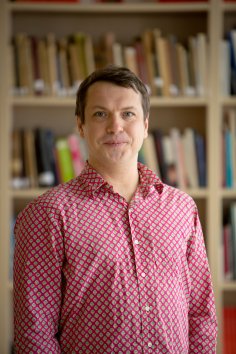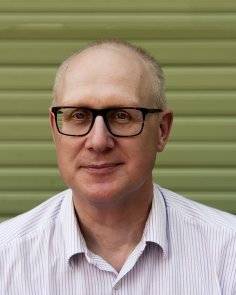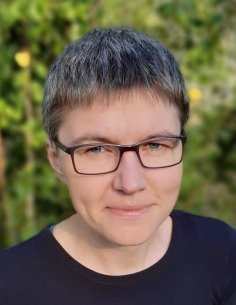Chair of History of Philosophy
The Chair of History of Philosophy teaches general courses in the history of philosophy as well as special courses on current philosophical problems seen from historical perspective. Our research focuses on Ancient Greek philosophy, Early Modern philosophy, classical German philosophy, 19th-century philosophy, phenomenology, existentialism, being-historical thinking, hermeneutics, Continental aesthetics, 20th-century French philosophy and Estonian philosophy.
|
Image

|
Roomet Jakapi Areas of Specialisation: History of Philosophy (Early Modern), Philosophy of Religion E-mail: roomet.jakapi@ut.ee |
I have worked at the Depatment of Philosophy at the University of Tartu since 2003. Currently I'm the Head of the Chair of History of Philosophy. My PhD dissertation was on the philosophy of George Berkeley.
My areas of research are Early Modern Philosophy and contemporary analytic Philosophy of Religion.
I teach introductory courses in Philosophy and History of Philosophy, as well as a specialized course in the Philosophy of Religion.
I have published a number of newspaper articles on problems facing higher education and given several radio talks on Philosophy.
Centre of Excellence in Estonian Studies (CEES) project (SHVHV16145T, 2016-2023, PI Mare Kõiva). The Centre brings together 15 research groups with more than 60 researchers in addition to more than 50 post-graduate students from the Estonian Literary Museum, the University of Tartu (from the sphere of the humanities and arts as well as from the natural and exact sciences), the Institute of the Estonian Language, Tallinn University, the Estonian Academy of Music and Theatre, and the Institute of Cybernetics at the Tallinn University of Technology. The Centre studies the linguistic and cultural dimensions of Estonia and Estonian identity, both from a historical and contemporary perspective.
“Plantinga, Schellenberg, and Mental Images at the Heart of Faith,” in Dahl, E., Henriksen, J.-O., Mjaaland, M. T. (eds.), Imagination in Religion: Perspectives from the Philosophy of Religion, Münster: LIT Verlag, 2021, 97−110.
“Early Modern Natural Philosophy Allied with Revealed Religion: Boyle and Whiston,” in Fuller, M., Evers, D., Runehov, A., Sæther, K-W., Michollet, B. (eds.), Issues in Science and Theology: Nature – And Beyond. Transcendence and Immanence in Science and Religion, Springer, 2020, 233−243.
“Berkeley's Theory of Meaning in Alciphron VII,” British Journal for the History of Philosophy, 17, 1, 2009, 99-118 (co-authored with Kenneth Williford).
|
Image

|
Toomas Lott Area of specialisation: History of philosophy (Ancient), epistemology Postal address: E-mail: toomas.lott@ut.ee |
I rejoined the Department of Philosophy in 2018 after being a Fulbright Scholar at Columbia University (2013-2014) and then a Marie Curie Scholar at New York University (2015-2018).
My main research area is Ancient Philosophy (especially Socrates and Plato) but I have also substantial interests in contemporary Epistemology.
The courses that I have taught in recent years include "Philosophy as a Way of Life", "Ancient Skepticism", and "Applied Epistemology"
From September 2022 - August 2025 I will be a researcher at the University of Uppsala Department of Philosophy within the project "Joint Inquiry", which approaches Plato's dialogues as examples of joint inquiry and attempts to draw lessons about the nature of joint inquiry from them. // Centre of Excellence in Estonian Studies (CEES) project (SHVHV16145T, 2016-2023, PI Mare Kõiva). The Centre brings together 15 research groups with more than 60 researchers in addition to more than 50 post-graduate students from the Estonian Literary Museum, the University of Tartu (from the sphere of the humanities and arts as well as from the natural and exact sciences), the Institute of the Estonian Language, Tallinn University, the Estonian Academy of Music and Theatre, and the Institute of Cybernetics at the Tallinn University of Technology. The Centre studies the linguistic and cultural dimensions of Estonia and Estonian identity, both from a historical and contemporary perspective.
“Plato on the Rationality of Belief” in Trames. A Journal of the Humanities and Social Sciences, 2011, vol. 15, issue 4, 339-364
“Socrates on Intellectual Autonomy and Authority”, forthcoming in Pettersson and Remes (ed.) Platonic Autonomy (CUP)
|
Image

|
Andrus Tool Area of specialisation: History of philosophy, hermeneutics Postal address: E-mail: andrus.tool@ut.ee |
I received my undergraduate degree in Philosophy from Moscow State University in 1984 and my MA from the University of Tartu in 1991. I earned my PhD from the University of Tartu in 2014. I have worked as a lecturer in Philosophy at the University of Tartu since 1984.
My primary research interests are in "Lebensphilosophie" (the philosophy of life, a dominant philosophical movement of German-speaking countries in the late 19th and early 20th centuries, which had developed out of German Romanticism) and hermeneutics as addressed in the history of philosophy (in particular, the work of W. Dilthey and H.G. Gadamer).
I teach history of philosophy spanning from the pre-Socratic period right up to the 20th century.
I have published commentated translations of works by Dilthey, Gadamer, Kant, Schleiermacher, Heidegger into Estonian. I have also published pieces which introduce academic articles from my own areas of specialiation but specifically for a popular audience in the Estonian cultural periodical "Akadeemia".
My main work is published in Estonian. But in English, I have a paper "Wilhelm Dilthey" in the collection The Oxford Handbook of Process Philosophy and Organisation Studies. Edited by J. Helin, T. Hernes, D. Hjorth, R. Holt. Oxford University Press 2014, pp. 129-142.
|
Image

|
Karin Kustassoo Area of specialization: History of philosophy, phenomenology, existentialism Address: E-mail: karin.kustassoo@ut.ee |
I have been a research fellow in History of Philosophy at the University of Tartu since 2020. I defended my doctoral thesis on Kierkegaard’s place in young Heidegger’s philosophy at Leiden University in 2018. Previously, I have researched the philosophy of Kierkegaard and young Heidegger also at the University of Tartu (BA and BA in Philosophy), at the University of Copenhagen (Denmark; MA in Philosophy), and, as a visiting scholar, at the Protestant Theological University (The Netherlands). I began, however, with studies of history at the University of Tartu, where I received a degree of Baccalaureus Artium by defending the thesis on Heraclitus' Fragment B 50 in 2006.
Broadly speaking, my areas of specialization are existentialism and phenomenology (in the continental tradition). At the centre of my research is the philosophy of the young Martin Heidegger and Søren Kierkegaard. I am especially interested in problems of method: the ways there are to understand, access, and express a given subject matter. I also have a keen interest in the development of different traditions of interpretation.
I have mainly taught courses on the philosophy of Søren Kierkegaard and of Martin Heidegger. At Leiden University, I led a reading group that focused on Heidegger's writings as well as other different critical texts in the phenomenological tradition.
I am always happy to participate in talks at events meant for the wider public.
In 2020 I began the research project "Ways to understanding: (religious) disagreements and the possibility of agreement on the basis of young Heidegger's phenomenology" (MOBJD650, 01.09.2020−31.08.2022). The project seeks to explore and use the resources found in the philosophy of young Heidegger to address the problem of agreement and disagreement with the ultimate aim of better understanding the nature of religious (dis)agreements.
Kustassoo, Karin (2018). Paths towards philosophy. Søren Kierkegaard’s place in Martin Heidegger’s first Freiburg period lecture courses (1919–1923). Ph.D. thesis, Leiden University, 2018. 259 pages. Available at: http://hdl.handle.net/1887/63087).
